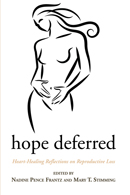
I’ve been doing some reading on loss and grief the past few weeks, but some of the most profound essays I’ve read on the subject have come out of a little book called “Hope Deferred: Heart-Healing Reflections on Reproductive Loss.” Wow. This book is amazing, and worth reading even if you haven’t gone through any type of reproductive loss (which is the term they use for those having dealt with infertility, a miscarriage or a stillbirth). The way in which these women authors deal with some of life’s hardest and theology’s most profound questions is humbling.
 Sarah read a few of the essays, and I think I was particularly moved by the same ones she was. It’s hard not to read about people going through very similar experiences and not feel deeply connected and know that you were and are wrestling with the very same issues. In the first essay, “Why?” by Nadine Pence Frantz, she shares about years of infertility, finally getting pregnant, and then losing her baby at 20 weeks. She works through some of the typical theological explanations for these types of horrific experiences: God has a plan for you, this death/grief is a test, it’s a sacrifice/burden to bear. I don’t know that she arrives at any explanation that’s any better than those typically offered in classical theology, but her honesty in her grief is refreshing.
Sarah read a few of the essays, and I think I was particularly moved by the same ones she was. It’s hard not to read about people going through very similar experiences and not feel deeply connected and know that you were and are wrestling with the very same issues. In the first essay, “Why?” by Nadine Pence Frantz, she shares about years of infertility, finally getting pregnant, and then losing her baby at 20 weeks. She works through some of the typical theological explanations for these types of horrific experiences: God has a plan for you, this death/grief is a test, it’s a sacrifice/burden to bear. I don’t know that she arrives at any explanation that’s any better than those typically offered in classical theology, but her honesty in her grief is refreshing.
In terms of dealing with grief, I found this paragraph particularly helpful:
“Because of the relational nature of self and identity, the living must remake themselves after a death. This is the crux of the grief work; death shatters the present self, and the question becomes “who am I, now?” with this death, with this loss of a future? Falling into grief, the familiar self and its constructs disappear, which is when we sense the utter absence of God and the need for complete reconstruction. One cannot just step outside of that breaking apart and reconstructive work by transcending it or quickly ‘getting over it.’ The only consolation that can be imagined in the moment of grief is having the baby in one’s arms. And that is now impossible.”
Sarah and I have talked about that part of it – the deconstruction of who we are, the deconstruction of the views we had about ourselves, our future, our hopes and dreams for Micah and Judah. This type of reproductive loss most certainly is a loss of hope.
And yes, there will be reconstruction that takes place. It’s not about “getting over it” or moving on or forgetting about Micah and Judah. They will be forever a part of the reconstructive work that takes place.
However, the most moving and theologically inspiring essay in the book is called “Rupture” by Serene Jones. I don’t know if you can find it elsewhere, but she has written about her experiences of miscarriage before. In the essay she weaves together her own story of loss and grief in losing a baby, with a personal reflection of attempting to provide pastoral care for a young woman who also just had a miscarriage. I don’t know that I’ve read something that has been so theologically rich, real, raw, honest and profound as this essay. If I have, I’ve forgotten it. This essay alone is worth the cost of the book. There’s not much more I can say about Jones’s article other than it spoke to me, in my grief, in a way that nothing else has yet, and I commend it to you.

I continue to pray for you all in this time of reconstruction…may your hope be restored in deeper ways. peace, mihee